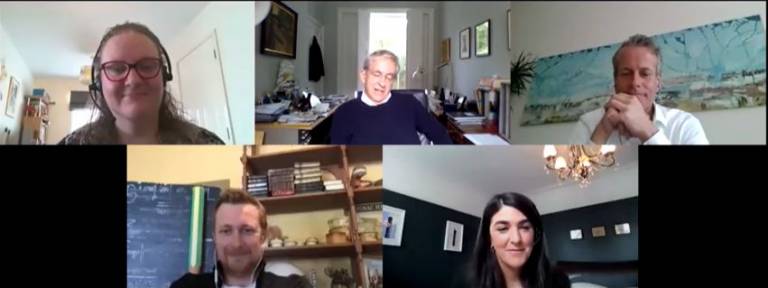Find out more about the events held in 2021
AI: Reinventing Inventorship?
1 December 2021

On 1 December 2021, the Institute of Brand and Innovation Law (IBIL) at UCL Laws co-hosted an online panel event, chaired by Gwilym Roberts, Honorary Professor at Queen Mary, University of London, in conjunction with the UK Chartered Institute of Patent Attorneys (CIPA). The topic of the seminar centred on the UK Intellectual Property Office (UKIPO) latest consultation on AI and patents which looks, inter alia, on the issue of AI and inventorship, in light of the Court of Appeal's decision in Thaler v Comptroller General [2021] EWCA 1374. Here the court upheld the earlier decision of the UKIPO and High Court i.e. that a patent application filed by Dr Stephen Thaler should be deemed withdrawn because current patent law requires applicants to identify a human inventor, whereas Dr Thaler had stated the inventor was DABUS (the name of Dr Thaler’s AI machine).
Dr Nicki Curtis, Senior Policy Advisor at the UKIPO outlined the scope of the Office's current consultation, which asks: 'Should we protect AI-devised inventions and if so, how should they be protected?' The consultation proposes the following four options for consideration:
- Option 0 maintains the status quo - patents can only be granted where the deviser of the invention is human.
- Option 1 redefines the definition of 'inventor' in the UK Patents Act to include 'humans responsible for making the arrangements for AI to devise an invention'.
- Option 2 permits patents devised by AI, by either amending the legislation to allow AI systems to be named as an inventor; or by removing the requirement to name an inventor if it is an AI system.
- Option 3 proposes a new sui generis 'patent-like' right to protect inventions devised by AI.
These options were then debated by the others on the panel: Professor Ryan Abbott, University of Surrey; The Hon. Justice Beach, Federal Court of Australia; and Dr Coreena Brinck, Member of CIPA's Computer Technology Committee.
Overall, there was little support on the panel for Option 0, given the increasing role that AI is likely to play in devising new technological solutions, which might be patentable inventions. The legislation should be revised to reflect reality and encourage transparency, else applicants are likely to 'fudge' the issue of inventorship. Option 1 was an transplant from UK copyright law (itself under review) but might lead to issues as to the identity of the 'human responsible' - which might be the programmer of the AI and/or the operator of AI operator and/or someone else. Option 3 - the creation of a new right was also likely to be problematic, since it raised so many new issues (How would patentability be defined? What protection would be on offer? How long would it last? Would it cover 'hybrid' inventions jointly devised by humans and AI?) that it would create uncertainty. On balance, this left Option 2 as the approach which the panel preferred approach.
The panel also agreed that AI inventorship was a problem that required an International solution. Currently, the positions adopted by patent offices around is split.
- Read more about the seminar on the event page
- Watch recordings of the event on the UCL IBIL YouTube Channel
- Review the presentation slides
- Participate in the consultationby sending your comments to the UKIPO: AIcallforviews@ipo.gov.uk
AI and Copyright: What Next?
9 July 2021

On 9 July 2021, the Institute of Brand and Innovation Law (IBIL) at UCL Laws co-hosted an online panel event, chaired by The Rt. Hon. Sir Christopher Floyd, Honorary Professor at UCL Laws, in conjunction with the UK Intellectual Property Office. The event, organised by Honorary Lecturer Dr Daniela Simone, was held to discuss the findings and potential implications of the Office’s recent consultation on artificial intelligence (AI) and intellectual property (IP) (the Response) on UK copyright law. The level of interest in Response and its contents were evident from the large and wide-ranging international audience, with over 840 people registered for the event and attendees from 36 different jurisdictions.
The Response underlined the UK government’s aim to create an environment which places the UK ‘at the forefront of the AI and data revolution’. In respect of copyright and related rights, the UKIPO received numerous submissions from copyright owners, the creative and technology industries, licensing bodies, legal representatives, and academics. Two key areas emerged where there was no general consensus:
- Whether copyright should protect works created by AI.
- How best to regulate use of copyright works as training data for AI systems.
These provided the main themes for the panel discussion and audience questions.
After a brief welcome from IBIL director, Professor Sir Robin Jacob, Margaret Haig, UKIPO Head of Copyright Operations kicked off the discussions, by outlining the Report’s main findings. Alexandra Condon, Head of Public Affairs at PRS for Music then presented the copyright owner’s perspective favouring a licensing approach. Tobias Mckenney, European Copyright Counsel for Google focussed mainly on the user perspective, examining issues of copyright and AI governance, as well as some practical aspects including jurisdictional issues and remedies. Professor Dr Martin Senftleben from the University of Amsterdam shared the findings of his recent co-authored paper on the benefits of protecting AI-generated works under a sui generis right, rather than copyright, having lesser duration and scope, to ensure that such works were available for use as the basis for further human and AI-creations.

- Read more about the seminar on the event page: AI and-Copyright: What next? or in this Event Report by Bird & Bird
- Watch recordings of the event on the UCL IBIL YouTube Channel
- Review the
- Send your comments to the UKIPO: copyrightconsultation@ipo.gov.uk
World IP Day, Life on the IP Bench and Other Things: A Conversation with Professor Sir Robin Jacob
26 April 2021

In this special World IP Day event, IBIL welcomed an audience of IP judges, practitioners, scholars and students from around the world to join Daniel Alexander QC in discussion with the Professor Sir Robin Jacob to mark Sir Robin’s contribution to IP law on the auspicious occasion of his 80th birthday.
Sir Robin needs little introduction. Having enjoyed a distinguished career spanning 40 years as a leading member of the IP Bar, a High Court Judge and then a judge in the Court of Appeal of England and Wales, he has left an indelible mark on IP laws in the UK and influenced the law’s development in Europe and beyond.
- Read more about the seminar on the event page here.
- Watch a record of the event on the UCL Laws YouTube Channel here.
Perfecting Pharmaceutical Trade Mark Protection: Pinnacles and Pitfalls
10 February 2021

When it comes to 'top trade mark filers', then we have come to expect the names of well-known pharmaceutical companies featuring high up in the rankings. It is perhaps not surprising that the number of current pharmaceutical trade marks on the UK or EU Registers far exceeds the number of medicaments which are actually authorised for use. The sheer volume of Class 5 registrations is testament to significant role that brand protection plays in pharma corporate strategy. Most of us are also familiar with the way in which a successful mark, such as NUROFEN, LEMSIP or VIAGRA, serves to sustain a price premium, even though patent protection has expired. The sector has also embraced non-traditional trade marks, seeking registration for product shapes, colours, get-up and the like.
Despite the pharmaceutical sector being such a significant user and beneficiary of trade mark registration systems, it faces specific challenges which others do not. These arise from the nature of the products, the market in which it operates, and the regulatory framework which runs in parallel with the usual trade mark rules. There is additional complexity in each step in the process, from clearing a name for use, securing a trade mark registration, maintaining its validity and finally, enforcing these rights.
IBIL brought together a distinguishing panel to discuss how this potentially treacherous path may be navigated successfully.
- Read more about the seminar on the event page here.
- Watch a record of the event on the UCL Laws YouTube Channel here.
- Download a copy of the slides.
 Close
Close

